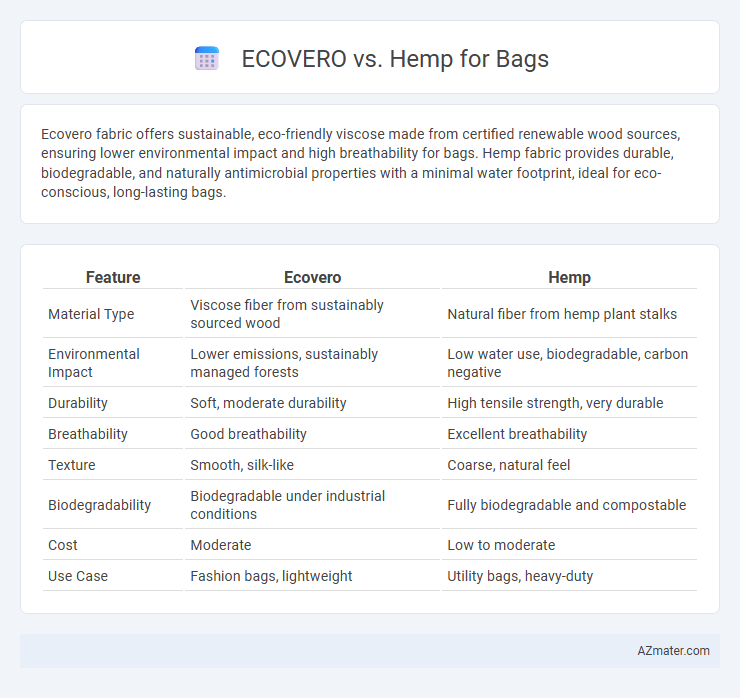Ecovero fabric offers sustainable, eco-friendly viscose made from certified renewable wood sources, ensuring lower environmental impact and high breathability for bags. Hemp fabric provides durable, biodegradable, and naturally antimicrobial properties with a minimal water footprint, ideal for eco-conscious, long-lasting bags.
Table of Comparison
| Feature | Ecovero | Hemp |
|---|---|---|
| Material Type | Viscose fiber from sustainably sourced wood | Natural fiber from hemp plant stalks |
| Environmental Impact | Lower emissions, sustainably managed forests | Low water use, biodegradable, carbon negative |
| Durability | Soft, moderate durability | High tensile strength, very durable |
| Breathability | Good breathability | Excellent breathability |
| Texture | Smooth, silk-like | Coarse, natural feel |
| Biodegradability | Biodegradable under industrial conditions | Fully biodegradable and compostable |
| Cost | Moderate | Low to moderate |
| Use Case | Fashion bags, lightweight | Utility bags, heavy-duty |
Introduction to Eco-Friendly Bag Materials
Ecovero is a sustainable viscose fabric derived from certified renewable wood sources, reducing environmental impact through responsible forestry and lower emissions. Hemp, a natural fiber from the Cannabis sativa plant, offers biodegradability, durability, and minimal water usage, making it an eco-friendly choice for bag production. Both materials provide sustainable alternatives to conventional plastics, promoting eco-conscious consumer choices in the bag industry.
What is Ecovero? Key Features and Benefits
Ecovero is a sustainable fabric made from certified renewable wood sources, designed to reduce environmental impact in textile production. Key features include eco-friendly manufacturing processes, lower water consumption, and biodegradability, making it an ideal alternative to conventional viscose. Benefits of Ecovero include enhanced softness, durability, and a reduced carbon footprint, providing an ethical choice for bags and fashion products.
What is Hemp? Key Features and Benefits
Hemp is a natural fiber derived from the stalk of the Cannabis sativa plant, known for its durability, breathability, and eco-friendliness. Key features include rapid growth without pesticides, high tensile strength, and biodegradability, making it a sustainable choice for bag production. Benefits of hemp bags include resistance to wear and tear, antimicrobial properties, and a lower environmental impact compared to synthetic materials and even some wood-based alternatives like Ecovero.
Environmental Impact: Ecovero vs Hemp
Ecovero fibers are derived from sustainably sourced wood pulp with a lower carbon footprint compared to conventional viscose, utilizing a closed-loop production process that recycles water and solvents to minimize environmental pollution. Hemp, a rapidly renewable crop, requires minimal water, pesticides, and herbicides, making it one of the most eco-friendly natural fibers with excellent biodegradability and carbon sequestration capabilities during cultivation. Both materials offer environmentally conscious alternatives, but hemp's low resource intensity and natural cultivation advantages often result in a smaller overall ecological footprint than the semi-synthetic production of Ecovero.
Durability and Strength Comparison
Ecovero fabric, derived from sustainably sourced wood pulp, offers moderate durability with a soft texture but is less resistant to wear compared to hemp. Hemp fibers provide exceptional strength and durability, making hemp bags highly resistant to tearing and ideal for heavy-duty use. The natural toughness of hemp outperforms Ecovero in long-term resilience, especially under frequent handling and environmental stress.
Aesthetic and Design Possibilities
Ecovero fabric offers a smooth, silk-like finish enabling vibrant dyes and intricate patterns, ideal for bags requiring sleek aesthetics and refined design elements. Hemp provides a natural, textured surface with a robust, rustic appeal that enhances eco-friendly and minimalist bag designs, emphasizing durability and organic charm. Combining Ecovero's luxurious look with hemp's sturdy texture allows designers to innovate versatile bags blending elegance and environmental sustainability.
Production Processes and Sustainability
Ecovero fibers are derived from certified sustainable wood pulp through a low-impact production process that uses 50% less water and emits up to 50% less greenhouse gases compared to conventional viscose, ensuring eco-conscious textile manufacturing. Hemp fibers are cultivated with minimal pesticides and synthetic fertilizers, requiring significantly less water than cotton, and their production sequesters carbon and improves soil health, making hemp highly sustainable for bags. Both Ecovero and hemp prioritize sustainability, but Ecovero emphasizes innovative chemical processes for fabric production, while hemp focuses on natural fiber cultivation benefits.
Cost and Market Availability
Ecovero fibers generally have a higher cost due to their sustainable production process derived from renewable wood sources, while hemp offers a more affordable option with a robust fiber yield and lower cultivation expenses. Market availability of Ecovero is currently more limited as it targets eco-conscious luxury brands, whereas hemp bags are widely accessible across mainstream and niche markets globally. Consumers often find hemp bags offer greater variety and competitive pricing, making them a popular choice for sustainable and cost-effective alternatives.
Consumer Preferences and Trends
Consumers increasingly prefer Ecovero fibers for bags due to their sustainable production process and reduced environmental impact compared to traditional viscose. Hemp bags are favored for their durability, natural texture, and biodegradability, appealing to eco-conscious buyers seeking long-lasting products. Market trends indicate a growing demand for hybrid bags combining Ecovero's softness with hemp's strength, aligning with consumer interest in both comfort and sustainability.
Final Verdict: Which Material is Better for Bags?
Ecovero offers sustainable, eco-friendly fabric derived from certified wood pulp, providing a soft, breathable texture ideal for stylish, lightweight bags with a lower environmental impact compared to conventional viscose. Hemp stands out for its remarkable durability, natural resistance to wear and tear, and minimal water usage in cultivation, making it a robust choice for heavy-duty, long-lasting bags. The best material depends on your priorities: choose Ecovero for smooth, sustainable fashion bags and hemp for rugged, eco-conscious durability.

Infographic: Ecovero vs Hemp for Bag
 azmater.com
azmater.com